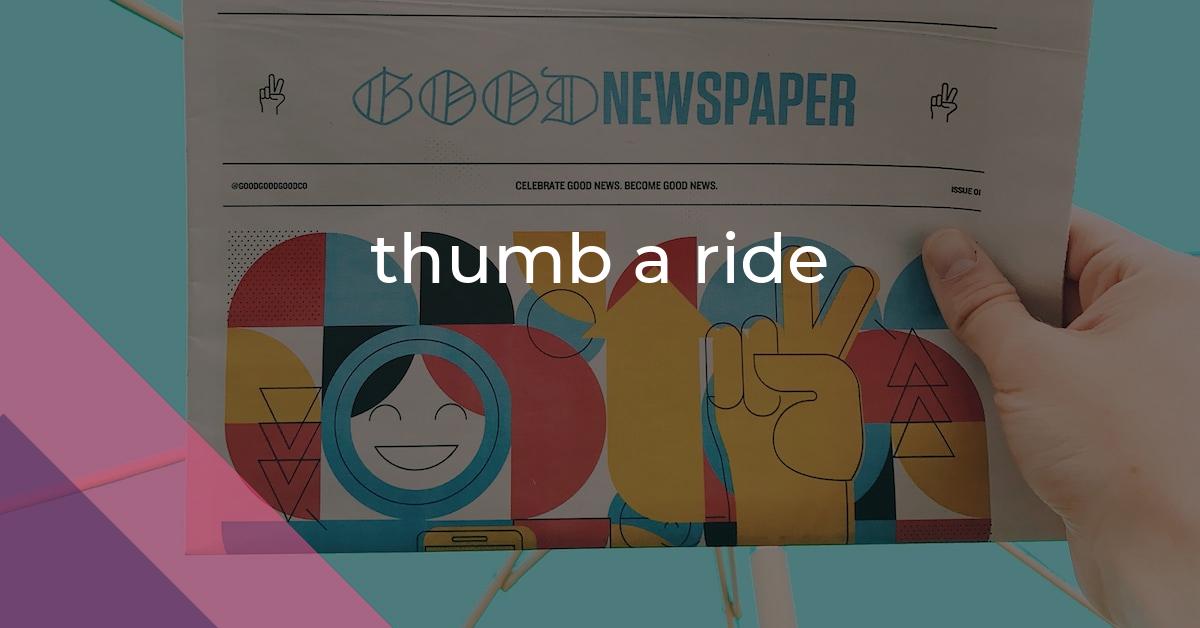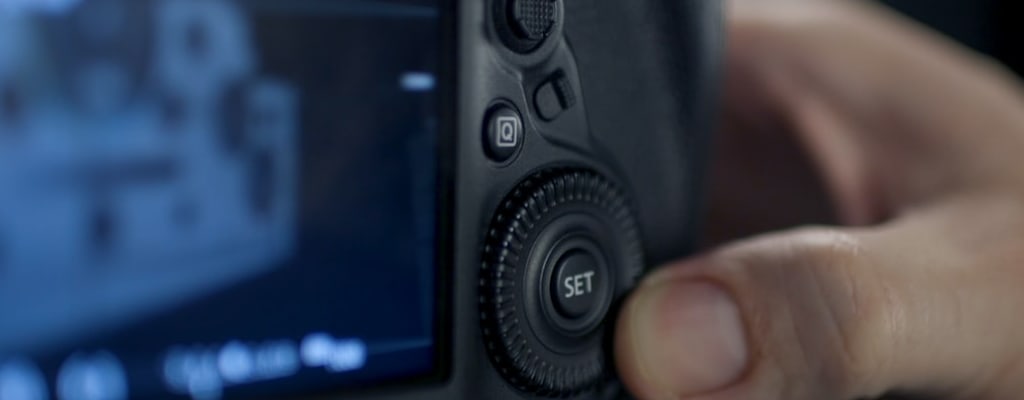thumb a ride: Idiom Meaning and Origin
What does ‘thumb a ride’ mean?
The idiom "thumb a ride" means to hitchhike by signaling a passing vehicle to stop and give you a ride by sticking out your thumb. It implies the act of relying on strangers for transportation.

Idiom Explorer
The idiom "two thumbs up" means to give a positive or favorable review or approval of something. It is often used to indicate strong support or enthusiasm for a person, idea, or product.
The idiom "twiddle one's thumbs" means to be idle or do nothing, often out of boredom or lack of work. It implies that a person is sitting with their hands folded and their thumbs moving in a circular motion, indicating their inactivity.
The idiom "ticket to ride" means a means of transportation or a mode of travel that allows someone to go somewhere or achieve something.
The idiom "thumb on the scale" means to unfairly influence a situation or outcome in one's favor by cheating or manipulating the circumstances.
The idiom "thumb one's nose" means to mock or show disrespect to someone or something in a defiant or insolent manner.
The idiom "take the ride" means to go along with the flow, accepting the unpredictable and uncertain outcomes of a situation without trying to control or change them.
The idiom "tag along" means to go with someone as a companion or follower, often without being invited or asked to join. It implies a sense of going along with someone else's plans or activities without taking the lead or having much say in the matter.
The idiom "swing through" means to visit a place or make a brief stop while traveling from one destination to another. It implies a casual or quick visit without spending much time or effort.
The idiom "ride the wave" means to go along with or take advantage of a favorable situation or trend. It implies adapting to the circumstances and enjoying the success or benefits that come from it.
"Ride the rails" is an idiom that means to travel by train, often used specifically to refer to the experience of being a hobo and illegally hopping on trains to get from place to place.
Decoding Hitchhiking Enigma
The phrase "thumb a ride" is a colloquial expression that describes the act of soliciting a ride from a passing vehicle by extending one's thumb. It originated in the early 20th century with the rise of automobile culture in the United States. As personal transportation became more common, so did the practice of hitchhiking. During the Great Depression and World War II, many individuals sought cheap or free transportation to their desired destinations, leading to the popularity of hitchhiking.
Hitchhiking, also known as thumbing a ride, involves signaling to passing motorists by extending one's thumb in an upward motion. This gesture universally communicates the request for a ride without the need for words. The idiom "thumb a ride" directly refers to this physical gesture and the practice of relying on the kindness of strangers for transportation.
The phrase "thumb a ride" not only has a literal meaning but also carries a figurative connotation. It represents the act of relying on others for assistance or support. Just as hitchhikers depend on the generosity of passing motorists, individuals who "thumb a ride" figuratively rely on the goodwill of others in various aspects of life.
One related idiom is "ticket to ride." Similar to "thumb a ride," it symbolizes reliance on others for transportation. However, "ticket to ride" implies a more formal means of travel, such as purchasing a ticket for a train, bus, or plane. In contrast, "thumb a ride" conveys a more informal and spontaneous way of getting from one place to another.
Another related idiom is "thumb one's nose," which means to show contempt or defiance. Although unrelated to transportation, this idiom shares the word "thumb" with "thumb a ride." The connection between the two idioms lies in the action of using one's thumb, albeit in different ways. While "thumb a ride" involves extending one's thumb for assistance, "thumb one's nose" involves thrusting one's thumb against the side of the nose in a dismissive manner.
Similarly, the idiom "ride the rails" also relates to transportation. It refers to the act of illegally hopping on a train and traveling as a stowaway. This idiom conveys the idea of seeking transportation without paying or obtaining proper authorization. Unlike hitchhiking, "riding the rails" carries a sense of risk and adventure, as it involves hiding from authorities and finding ways to survive on the train.
Another related phrase is "hitch one's wagon to," which means to attach oneself or one's interests to someone or something with greater success or influence. While "thumb a ride" involves relying on strangers for transportation, "hitch one's wagon to" signifies aligning one's aspirations or goals with a person or entity that can provide advantages or opportunities for advancement.
The final related idiom is "ride one's bumper," which refers to following a vehicle closely, often to the point of being a nuisance or causing frustration. Unlike "thumb a ride," this idiom focuses on the act of tailgating rather than seeking assistance. It implies a lack of respect for personal space and can lead to dangerous situations on the road.
The idiom "thumb a ride" originated from the practice of hitchhiking in the early 20th century. It involves signaling to passing motorists with an upward-thumb motion to request transportation. This phrase reflects the reliance on the kindness of strangers for a ride and can also carry a figurative meaning of depending on others for support or assistance. Additionally, related idioms such as "ticket to ride," "thumb one's nose," "ride the rails," "hitch one's wagon to," and "ride one's bumper" further explore the themes of transportation, defiance, aspiration, and annoyance.
Example usage
Examples of how the idiom "thumb a ride" can be used in a sentence:
- He had missed his bus, so he decided to thumb a ride with a passing car.
- After her car broke down on a deserted road, she resorted to thumbing a ride from a truck driver.
- As a hitchhiker, he often thumbs a ride to get from one city to another.
The phrase "thumb a ride" refers to the act of soliciting a ride by extending one's thumb in hopes that a passing vehicle will stop and offer transportation. It is commonly used to express the action of hitchhiking or seeking a lift from strangers traveling in the same direction. The idiom implies using one's thumb as a signal or gesture to indicate the desire for a ride. The act of thumbing a ride can be associated with situations such as missing transportation, a breakdown of personal transportation, or simply as a means of traveling between locations without using one's own vehicle. It is important to note that thumbing a ride can carry potential risks as it involves accepting transportation from unfamiliar individuals.
More "Transportation" idioms



